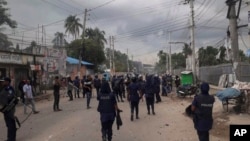Rights activists and opposition political leaders in Bangladesh have expressed concerns over the country’s draft Cyber Security Act, saying it is as repressive as the existing controversial Digital Security Act that it is set to replace.
The activists, along with journalists and opposition parties, have long demanded the scrapping of the DSA — widely criticized as a law to harass people and silence dissent.
Law minister Anisul Huq said on August 7 that the government would replace the DSA with the CSA in the “better interest” of the people.
“We have not scrapped the DSA but are amending it. Many of the clauses of this act, which were not bailable before [in the DSA] will be bailable now [in the CSA]. To stop the misuse and abuse of the DSA, we have changed its name. By evaluating the amended legislation correctly now, we have named it the Cyber Security Act,” Huq said.
Mohammad Ashrafuzzaman, liaison officer of the Hong Kong-based rights group Asian Legal Resource Center, told VOA the government of Bangladesh’s Prime Minister Sheikh Hasina has disregarded the independent human rights experts of the United Nations by keeping some provisions of the DSA in the new measure.
“While renaming the DSA, by keeping its repressive provisions largely unchanged and deciding to carry on the existing cases against the dissidents, the regime clearly aims to continue muzzling free expression and intensify arbitrary incarceration of citizens in the run-up to the general elections,” Ashrafuzzaman said.
Enacted under Sheikh Hasina
The DSA, enacted in 2018, has long been called a “black act” by critics for its alleged misuse against dissenters and freedom of expression.
Last year, Human Rights Watch reported that the Bangladeshi government used the DSA “to harass and indefinitely detain” people critical of the government, “resulting in a chilling effect on the expression of dissent.”
In March, Volker Türk, the United Nations high commissioner for human rights, called for the immediate suspension of the DSA, noting that it was being used “to arrest, harass and intimidate journalists and human rights defenders, and to muzzle critical voices online.”
‘CSA a photocopy of DSA’
During the runup to the general elections in 2018, the government cracked down heavily on opposition activists, arresting many of them on charges of resorting to violence and indulging in subversive activities.
The Bangladesh Nationalist Party, the largest opposition party in the country, said its leaders and activists faced trumped up charges to keep them away from the elections.
The elections were marred that year by allegations of vote rigging by the ruling Awami League party, a charge the party president, Hasina, repeatedly denied.
According to the information provided by the BNP, in the past five years, more than 30,000 cases were filed under the DSA, resulting in at least 17,150 arrests.
The BNP’s information and technology affairs secretary said at least 11,285 of those arrested under the DSA were from the BNP and other opposition parties and 368 were journalists. AKM Wahiduzzaman also told VOA that the law has been largely used to keep opposition leaders, activists and journalists from criticizing what he termed the government’s malpractices and anti-people activities.
“The CSA is nothing but a photocopy of the DSA. Under the CSA too, the police will have a free hand to arrest anyone they want, without any warrant,” Wahiduzzaman said.
The Ministry of Law and Justice has not responded to a VOA email requesting comment on the issue.




